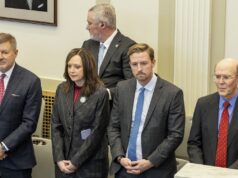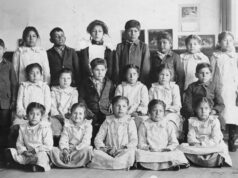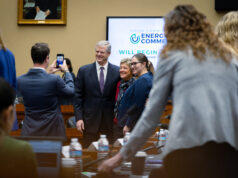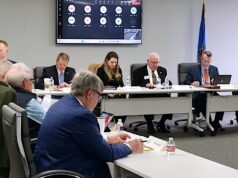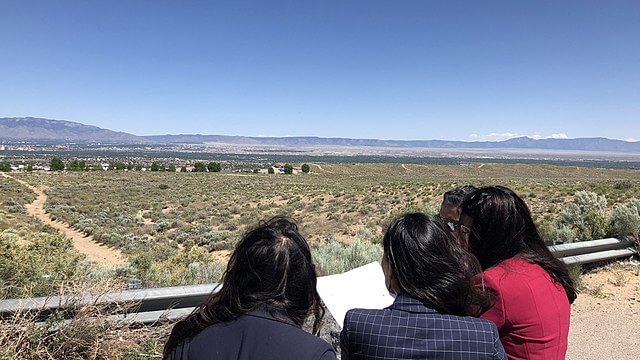

WASHINGTON — Secretary of Transportation Pete Buttigieg told reporters that infrastructure investment in Indian Country is a high priority of the proposed $2.2 trillion American Jobs Plan.
“When we talk about equity, we’re thinking a lot about racial and economic justice,” Buttigieg said.
He said the need to improve the 20th century infrastructure on the tribal lands of nearly 575 tribes, including 39 in Oklahoma, have been ignored by the federal government for years.
This story was reported by Gaylord News, a Washington reporting project of the Gaylord College of Journalism and Mass Communication at the University of Oklahoma.
“But we’re also thinking about stretches of this country that have too often been left out of the promises of this kind of great infrastructure,” Buttigieg said.
The American Jobs Plan is President Joe Biden’s more than $2 trillion plan to transform the nation’s infrastructure. Along with the American Rescue Plan, which included help for Native Americans to recover from the COVID-19 pandemic, the Biden administration intends for the American Jobs Plan to assist in solving tribes’ growing infrastructural needs.
“A lot of parts of Indian Country have been on the short end of inadequate infrastructure investment maintenance, over the years,” Buttigieg said.
In a press call Monday, the new secretary listed critical water infrastructure, internet broadband, housing, transportation, tribal colleges and universities and roads as focus areas in the American Jobs Plan for Native American communities.
Broadband was among the top priorities for tribes with the American Rescue Plan, which was to be addressed under funds from the U.S. Department of Housing and Urban Development. Many families did not have access to the internet throughout the pandemic, making it difficult for their students to attend distance learning classes.
Biden’s infrastructure plan aims to provide 100 percent broadband coverage across rural and tribal communities.
“The lack of access to broadband on tribal lands is particularly severe,” said Bharat Ramamurti, deputy director of the National Economic Council. “There’s going to be a significant tribal component to that.”
The American Jobs Plan also aims to inject funding into research and development programs for colleges and universities across the nation, including tribal colleges.
However, Monte Randall, president of the College of the Muscogee Nation, believes access to broadband internet is still the top concern for his students. Many of the college’s students live in rural areas where internet access is not available.
“There are definitely challenges with connecting to our students on virtual platforms,” Randall said.
The college received funding from the Higher Education Emergency Relief Fund within the CARES act to provide students with laptops and internet hotspots, but lack of internet access is still the biggest challenge.
The funding for land grants as well as research and development programs at tribal universities would help the university “move towards being more research-focused,” Randall said. The College of the Muscogee Nation is primarily focused on its natural resources programs, but this funding would allow the university to branch out further.
Tribes nationwide are already set to receive $651 million for housing from the American Rescue Plan, as well as $450 million in tribal housing assistance. Ramamurti said the American Jobs Plan will fix the lack of affordable housing, as well as the upholding of existing housing on tribal land.
“The lack of affordable housing… is a nationwide problem and particularly severe on tribal lands,” Ramamurti said. “There is also a specific problem with preservation and rehabilitation of existing housing on tribal lands, and so the housing components of the plan are focused on that area.”
Buttigieg stressed the importance of a robust transportation system in tribal and rural communities, which often are isolated from important resources.
“Transit, which I know people imagine is [in the] big city, but can be very important in a lot of counties,” Buttigieg said. “A transit system is an important part of helping people get around, it’s the same in Indian country.”
During the vaccination rollout, the Osage Nation purchased two mobile clinics with CARES Act funding to combat transportation issues across the nearly 1.5 million acres of Osage County.
The rural and tribal fact sheet states that the American Jobs Plan will “more than double the Tribal Transportation Program to provide safe and adequate transportation and public road access to and within tribal areas.”
Ramamurti reinforced Buttigieg’s comments on the underinvestment of the federal government in Native American communities.
“When it comes to infrastructure, the problem on tribal lands is particularly severe, reflecting — frankly — years and decades of underinvestment by the federal government,” Ramamurti said. “And I think part of what we’re trying to do here, addresses that.”










